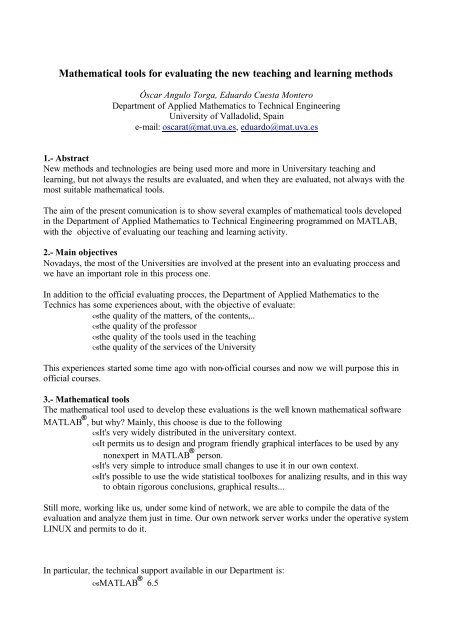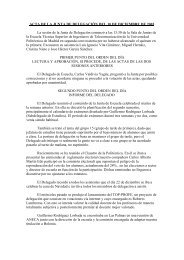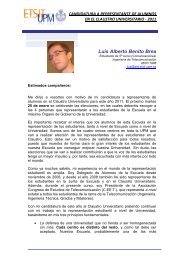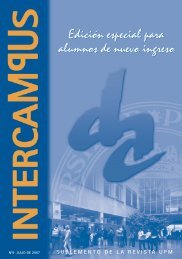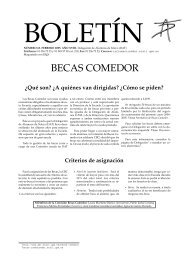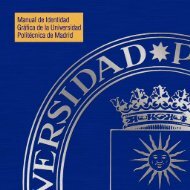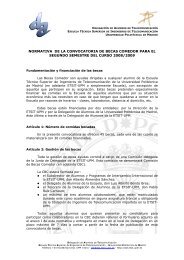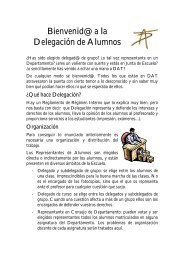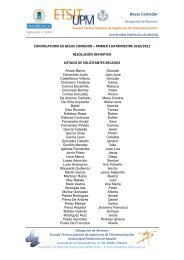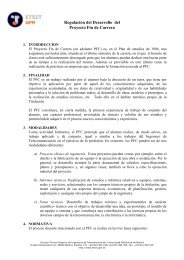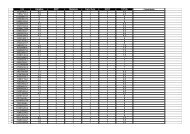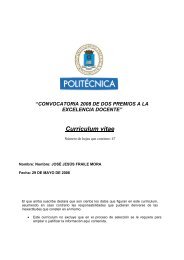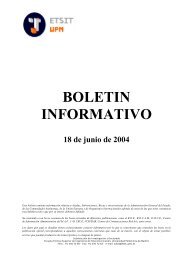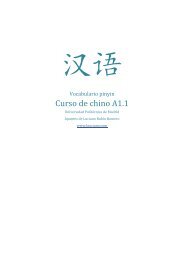Mathematical tools for evaluating the new teaching and learning ...
Mathematical tools for evaluating the new teaching and learning ...
Mathematical tools for evaluating the new teaching and learning ...
You also want an ePaper? Increase the reach of your titles
YUMPU automatically turns print PDFs into web optimized ePapers that Google loves.
<strong>Ma<strong>the</strong>matical</strong> <strong>tools</strong> <strong>for</strong> <strong>evaluating</strong> <strong>the</strong> <strong>new</strong> <strong>teaching</strong> <strong>and</strong> <strong>learning</strong> methodsÓscar Angulo Torga, Eduardo Cuesta MonteroDepartment of Applied Ma<strong>the</strong>matics to Technical EngineeringUniversity of Valladolid, Spaine-mail: oscarat@mat.uva.es, eduardo@mat.uva.es1.- AbstractNew methods <strong>and</strong> technologies are being used more <strong>and</strong> more in Universitary <strong>teaching</strong> <strong>and</strong><strong>learning</strong>, but not always <strong>the</strong> results are evaluated, <strong>and</strong> when <strong>the</strong>y are evaluated, not always with <strong>the</strong>most suitable ma<strong>the</strong>matical <strong>tools</strong>.The aim of <strong>the</strong> present comunication is to show several examples of ma<strong>the</strong>matical <strong>tools</strong> developedin <strong>the</strong> Department of Applied Ma<strong>the</strong>matics to Technical Engineering programmed on MATLAB,with <strong>the</strong> objective of <strong>evaluating</strong> our <strong>teaching</strong> <strong>and</strong> <strong>learning</strong> activity.2.- Main objectivesNovadays, <strong>the</strong> most of <strong>the</strong> Universities are involved at <strong>the</strong> present into an <strong>evaluating</strong> proccess <strong>and</strong>we have an important role in this process one.In addition to <strong>the</strong> official <strong>evaluating</strong> procces, <strong>the</strong> Department of Applied Ma<strong>the</strong>matics to <strong>the</strong>Technics has some experiences about, with <strong>the</strong> objective of evaluate:–<strong>the</strong> quality of <strong>the</strong> matters, of <strong>the</strong> contents,..–<strong>the</strong> quality of <strong>the</strong> professor–<strong>the</strong> quality of <strong>the</strong> <strong>tools</strong> used in <strong>the</strong> <strong>teaching</strong>–<strong>the</strong> quality of <strong>the</strong> services of <strong>the</strong> UniversityThis experiences started some time ago with non-official courses <strong>and</strong> now we will purpose this inofficial courses.3.- <strong>Ma<strong>the</strong>matical</strong> <strong>tools</strong>The ma<strong>the</strong>matical tool used to develop <strong>the</strong>se evaluations is <strong>the</strong> well known ma<strong>the</strong>matical softwareMATLAB ® , but why? Mainly, this choose is due to <strong>the</strong> following–It's very widely distributed in <strong>the</strong> universitary context.–It permits us to design <strong>and</strong> program friendly graphical interfaces to be used by anynonexpert in MATLAB ® person.–It's very simple to introduce small changes to use it in our own context.–It's possible to use <strong>the</strong> wide statistical toolboxes <strong>for</strong> analizing results, <strong>and</strong> in this wayto obtain rigorous conclusions, graphical results...Still more, working like us, under some kind of network, we are able to compile <strong>the</strong> data of <strong>the</strong>evaluation <strong>and</strong> analyze <strong>the</strong>m just in time. Our own network server works under <strong>the</strong> operative systemLINUX <strong>and</strong> permits to do it.In particular, <strong>the</strong> technical support available in our Department is:–MATLAB ® 6.5
–LINUX Red Hat, release 7.1 installed on a Pentium 3.–24 personal computers4.- MethodolgySeveral years <strong>teaching</strong> introductory courses on MATLAB ® give us some experience on <strong>the</strong>possibilities of MATLAB ® in educational context, in particular, in <strong>the</strong> context of <strong>the</strong> <strong>teaching</strong>evaluation. In this way several works was directed by us related to <strong>the</strong> programming educational<strong>tools</strong> under MATLAB ® .Next steps was several evaluations in nonoffical courses, always applying ma<strong>the</strong>matical <strong>tools</strong>developed by us under MATLAB ® . Year after year <strong>the</strong>se evaluations have been improved in <strong>the</strong>following sense:–More friendy <strong>and</strong> complete graphical interface.–Better list of questions (more questions, more precise questions, more interestingquestions,...)Actually we are working in an educational project supported by La Junta de Castilla y León in orderto continue improving this <strong>tools</strong>.5.- ResultsNext we will show how is <strong>the</strong> presentation of this <strong>tools</strong> by means of severals screen of it. Morecomplete underst<strong>and</strong>ing of this tool will be reached by means of a personal comunications
6.- ConclusionsMATLAB ® permits us to develop ma<strong>the</strong>matical <strong>tools</strong> by means of friendly graphical interfaces toevaluate <strong>the</strong> <strong>teaching</strong> activity with ma<strong>the</strong>matical rigor, easily trans<strong>for</strong>mable <strong>and</strong>, when a network isavailable, permits us to obtain <strong>the</strong> final results just in time.7.- References–Óscar Angulo, Eduardo Cuesta, César Gutiérrez, Carmen Martínez}, Guía Rápida de MATLAB ® ,IICE, 2001.–Adrian Biran, Moshe Breinner, MATLAB ® <strong>for</strong> Engineers, Addison-Wesley, 1997. S.J. Chapman,MATLAB ® Programming <strong>for</strong> Engineers, Brooks & Cole, 2000.–Walter G<strong>and</strong>er, Jiri Hrebicek, Solving Problems in Scientific Computing Using MAPLE <strong>and</strong>MATLAB ® , Springer, 1997.–Eva Part-En<strong>and</strong>er, Anders Sjoberg, The MATLAB ® h<strong>and</strong>book, Addison-Wesley, 1996.– César Pérez, Matem\'atica In<strong>for</strong>matizada con MATLAB ® , ra-ma, 1996.–Peregrina Quintela, Introducci\'on a MATLAB ® y sus aplicaciones, Universidad de Santiago deCompostela, 1997.–Redfern, D, The MATLAB ® 5 H<strong>and</strong>book, Springer, 1997.–Kermit Sigmon, MATLAB ® Primer (Fifth Edition), CRC Press, 1998 .–Aprenda MATLAB ® 5.3, Como si Estuviera en Primero, Universidad de Navarra, 1999.–www.mathworks.com


